Write Us
We are just a call away
[ LET’S TALK AI ]
X
Discover AI-
Powered Solutions
Get ready to explore cutting-edge AI technologies that can transform your workflow!

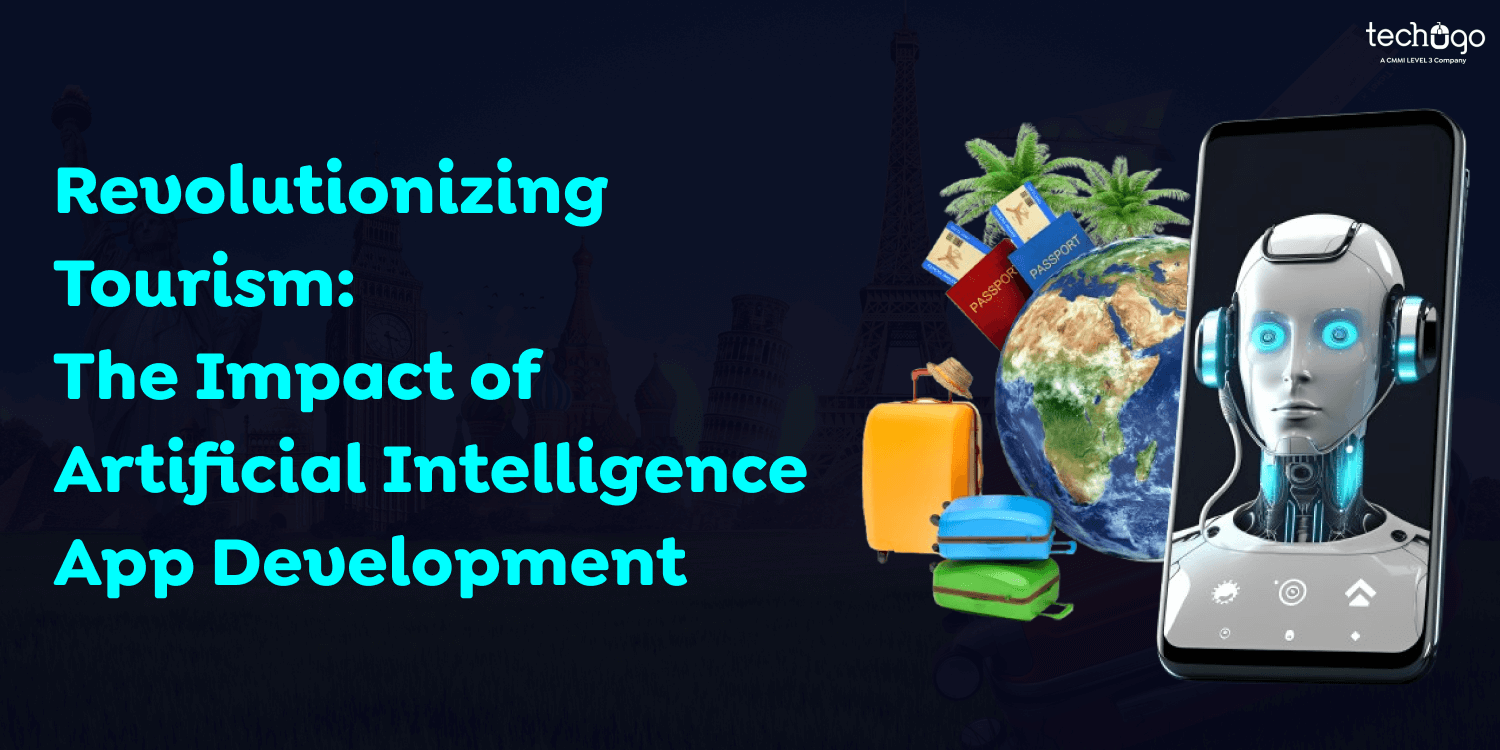
Traveling is becoming more convenient due to AI development in travel technology. Why shouldn’t we be looking forward to visiting somewhere completely new? Travel has never been this customized or convenient before.
AI helps make planning your perfect vacation simple, depending on your preferences and style of travel. It reduces the time spent searching for hotels and flights.
AI technology has rapidly proved an essential travel aid, acting as a potent travel agent inside your pocket. AI assistants can help you find the best prices, navigate destinations, and translate different languages easily to make it easier for you to understand.
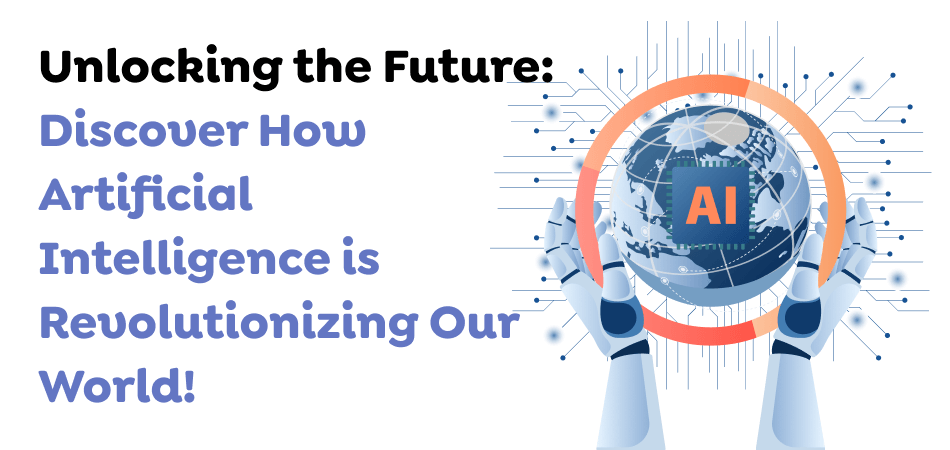
Artificial Intelligence, or AI, refers to machines or computers doing tasks that generally require human intelligence. In simpler terms, Intelligence can perceive, synthesize, and interpret information that differs from the Intelligence of human beings or other living creatures.
AI has been around for quite some time. However, the technology has become capable of completing complicated tasks with little to no assistance due to necessary improvements. Modern businesses are heavily dependent on data. This allows AI to complete tasks ranging from processing and analyzing data to solving problems. Artificial Intelligence app development in the travel industry can simplify processes, allowing more room for human error and offering a more customized experience to their guests. This is all while spending less both time and money!
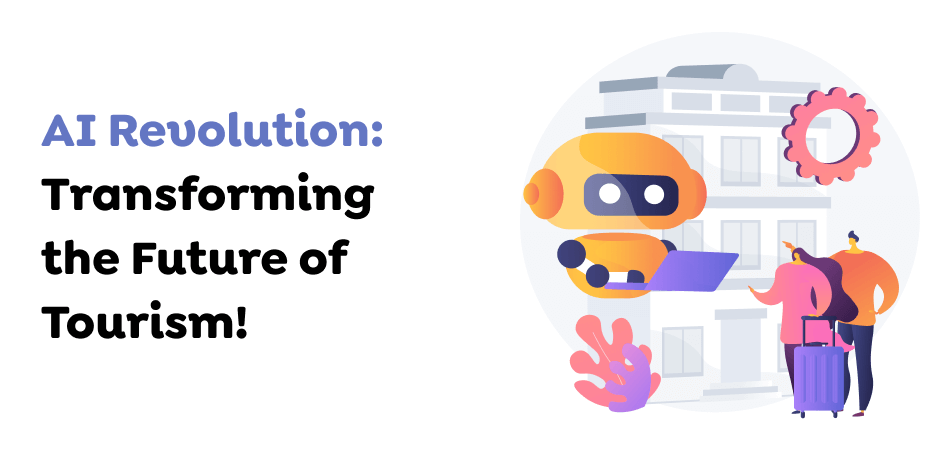
Artificial Intelligence innovations in tourism must include these elements:
IoT sensors monitor temperature, room occupancy, lighting, and guests’ preferences and automatically adjust them to guests’ preferences. Through simple voice assistants, people can manage temperature, lighting, and entertainment industry systems, along with intelligent thermostats, doors, tablets, and door locks, which provide security and convenience for guests.
Also Read : How does an Artificial Intelligence App add Great Potential to your Business?
The software for forecasting flights uses historical and current data, such as atmospheric conditions and weather patterns, as well as air traffic volume and flight characteristics from the past, to accurately predict delays or cancellations that impact flights. Businesses use it to anticipate delays, cancellations, or interruptions as soon as possible and reduce costs, travel time, and expense.
If disruptions are accurately anticipated, Airlines and travel agents can provide passengers with technological advances notice and allow them to rebook flights swiftly to reduce the impact of travel routes on travel time and minimize disruptive disruptions. Such systems can also improve flight schedules, crew allocation, and fuel consumption.
Bots, which can process natural languages (NLP), are highly efficient AI machines that can respond to customer inquiries, offer suggestions, and perform other duties for themselves. Airports and hotels increasingly use them for concierge and room services, baggage handling, and check-in assistance.
They continuously enhance interactions with guests and employees, allowing them to concentrate more efficiently on difficult tasks. Additionally, their presence creates modern and exciting environments, differentiating companies from competitors.
Intelligent baggage management systems improve bag transportation and tracking procedures to reduce the risk of theft or mishandling. By utilizing IoT sensors and machine-learning algorithms, Smart luggage systems let passengers track their luggage from the point of origin until its final destination, ensuring timely delivery without delay or mishaps.
Image recognition technology is a system that automatically sorts and routes luggage to airports and airlines, reducing physical labor while improving overall efficiency.
VR and AR technology is revolutionizing travel planning and experiences for all travelers. Let potential customers virtual examine their destinations, accommodations, and other attractions before booking to have a true-to-life preview experience before making a purchase.
VR and AR technology enhance the user experience on-site by offering interactive online guides, navigation tools, historical context, and preservation of historical information—increasing the connection between travelers to destinations and different cultures around the world.
Also Read : Ride Sharing App Development: A Gateway to Enhance Travel & Tourism Industry
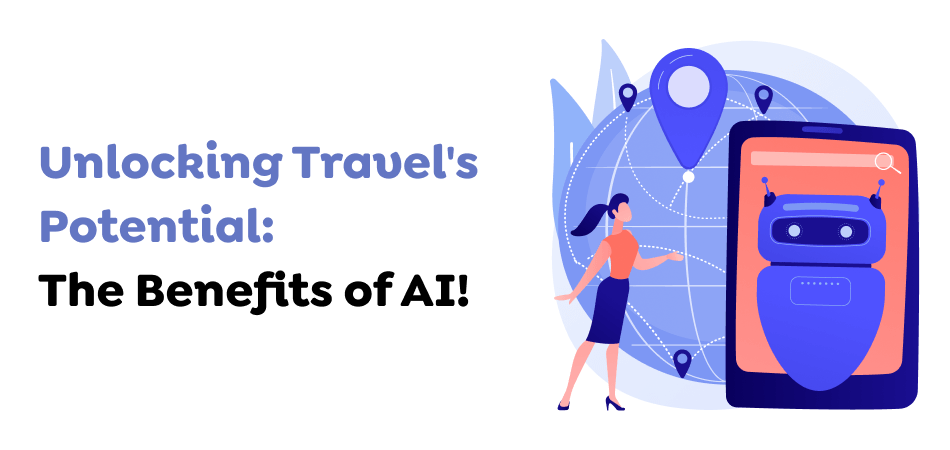
AI can make tourism and travel more enjoyable and efficient. AI handles everything from predicting travelers’ preferences to customizing itinerary planning.
In this part, we’ll look at ways AI can benefit clients in the tourism industry.
According to market research, 30 percent of tourists decide to plan their next vacations with phones or other systems. Fifty percent of tourists do not require any guide to navigate their journeys, as smart travel apps help them along their journey.
Whether you’re planning a romantic or adventurous journey, clever AI-powered travel software will design it based on your personal preferences. Many travel companies invest in AI and offer personalized services to their customers based on their preferences.
The travel industry is investing in AI to offer tailored travel planning services. During their stay, businesses offer free amenities like food and drinks, hospitality industry, and more.
AI helps travel agents provide better service and draw more customers. Customers can also benefit from AI technology by discovering new destinations and trying new experiences, such as a trip to a new place.
Also Read : How AI is Revolutionizing Taxi Booking App Development: Benefits, Features, and Future Prospects
One of the more exciting applications of Artificial Intelligence for the tourism industry and hotel companies is providing online support to customers. Chatbots available on social media sites and instant messaging apps, particularly, have already received widespread acceptance.
When AI is employed in this manner, it can respond to inquiries and provide relevant information to customers, even if the customer support rep is not in the office. Customers want faster and quicker responses on online platforms, and AI helps businesses respond to these needs in ways that humans can’t.
It is also crucial to realize that the use of AI in the tourism and travel business is wider than customer service. One of its most popular and successful applications is gathering and analyzing data to conclude customers, business operations, and pricing strategies.
AI’s most significant advantage in this field is its capacity to interpret large volumes of data quickly and accurately, while humans must wait a lot longer and make more errors.
Each year, airports receive millions of bags. SITA, the airport IT company, is using AI to enhance luggage handling. Shortly, airports will be fully automated through AI and robotics, and lost luggage can be dealt with intelligently.
AI technologies have been implemented in pilot projects in a few airports. Eindhoven Airport, for example, has installed AI-powered luggage management systems that don’t require baggage labels.
When people want to learn more about a business and its products, they browse the internet to read reviews. Customer reviews are crucial in establishing a brand’s reputation, and a negative review can harm the brand’s image.
In the field of travel, AI aids corporations in reviewing customer feedback and postings via social platforms. AI allows companies to monitor their brand’s performance within the marketplace automatically.
Airlines and hotels can use AI for travel to react to negative comments and track market trends. They can also analyze customers’ needs. AI assists travel companies in developing their brands, sales, and earnings.
You may notice a price rise when you look for flights or hotels more than once. Ultimately, customers are not likely to buy tickets for significantly more than usual. The dynamic pricing tools powered by AI will help you with this.
The tools use predictive analytics to analyze rival price comparisons and provide accurate prices. This method could allow travel companies to attract more customers.
Facial recognition is yet another AI software that’s becoming popular in travel. Software that recognizes faces analyzes and compares the patterns in fully integrated biometrics.
It analyzes biometrics in US airports that convert facial features from images to numerical features through artificial neural networks. This machine compares features against a database to see whether they’re similar.
Numerous airports worldwide, including the ones mentioned above, have started using facial recognition technology. This allows passengers to complete check-ins and document inspections faster and effortlessly. JetBlue Airways also uses facial recognition to ensure a paper-free boarding experience.
The airline implemented fully integrated biometric self-boarding gates at certain airports throughout the US, including New York’s John F. Kennedy International Airport, in partnership with US Customs and Border Protection (CBP) (JFK ).
Also Read : Revolutionise Air Travel with Aviation Software App Development in 2024!
The integration of AI in hospitality and travel will propel the industry forward. However, it also poses several complex issues and risks. While we explore AI’s vast function, we should also be aware of the potential dangers of this massive technological change.
AI-based solutions usually require substantial upfront investment in software, hardware, and training, which can be prohibitively expensive for small tour operator businesses.
Tour operators have several effective solutions available to tackle this issue. They could begin with small-scale AI implementations to show ROI before gradually increasing operations. Or, they could partner with AI solution providers that offer flexible pricing plans and shared infrastructure to lower upfront costs.
Also Read : Invest Smart: The Ultimate Guide to Crafting Winning Investment Apps
Travel experts are still determining what consumers would like to get from AI. Activity and tour operators must adopt specific AI initiatives that enhance customer experiences by enhancing their brand. At this point, experts are still trying to determine which methods work or aren’t effective.
AI-based algorithms demand vast amounts of reliable and pertinent data for training and inference. However, tour operators may have difficulty organizing and collecting the data across different sources, leading to inconsistent or incorrect information derived from AI insights.
Poor data quality could affect accuracy, leading to flawed choices or missed opportunities. To overcome this problem, tour operators need to implement sound policies for data governance, including cleaning, standardization, and quality checks that ensure the accuracy of information from multiple sources.
Introducing artificial Intelligence into the hospitality and travel industries is an essential ethical, privacy, security, moral, and security concern as it becomes more popular. AI algorithms need access to massive amounts of personal data on customers’ preferences, behavior, locations, and other information.
To generate insights and recommendations, tour operators must abide by local and international privacy regulations, such as GDPR/CCPA, regarding data collection/storage/use policies before using artificial Intelligence in this sector.
Artificial Intelligence is relatively new, and there could be a few bugs to work out in current AI applications as the travel industry leaders are figuring out how to make the most effective use of it. Travel and tourism operators might be uncertain about implementing artificial Intelligence into their operations because of the potential changes that could arise as the technology matures – it should be used as an indicator of its worth for tour operators or activity suppliers.
Thorough research must be conducted on every proposed technology to understand whether its implementation will provide tangible benefits that provide immediate value before making any decision concerning AI incorporation into their operations.
AI systems require continuous monitoring, repairs, and upgrades to function effectively and provide accurate information. Because AI technology develops rapidly, tour operators must keep up with the most recent technology and trends to stay competitive. However, this could be difficult for smaller tour operators that do not have the resources or know-how required to manage AI systems effectively.
Also Read : Flying Taxis Dubai: Aerial Vehicles Are Arriving to Reform the Worldwide Travel Experience
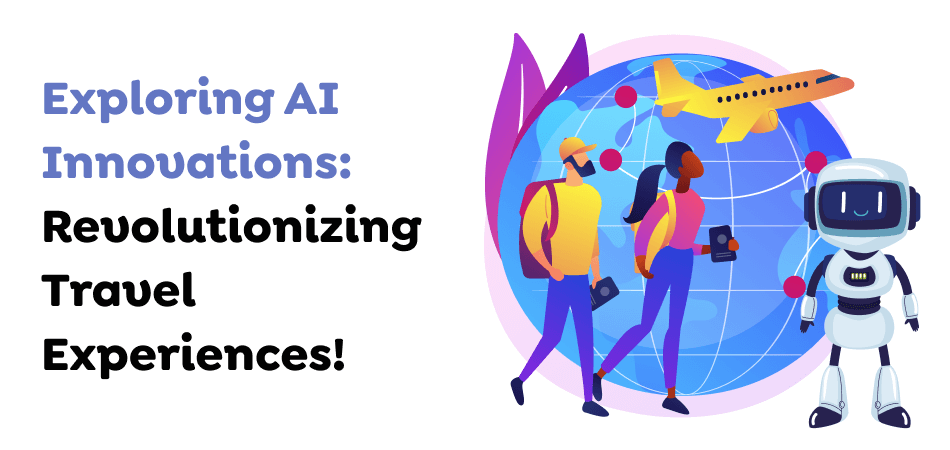
Artificial Intelligence (AI) has been a significant technical advancement in the travel industry, bringing many benefits for travelers and service providers and increasing customer service quality. Here are some ways AI can help:
AI-powered chatbots offer 24/7 customer service and can respond to frequently asked questions about travel questions or booking statuses, flight information, hotel reservations, and flight status. In addition, these AI chatbots aid travelers in communicating across different languages, breaking barriers to communication.
Chatbots can be invaluable when traveling. They offer local information, translation, and emergency support. Additionally, chatbots collect feedback from users, support marketing campaigns with targeted advertisements, and collect important information for analysis purposes.
Similar to AI chatbots, AI chatbot development company integrates with virtual agents converse with AI systems but with different scopes and capabilities from AI chatbots. They aim to surpass their limits by assisting in various aspects of user experience. They also utilize machine learning and artificial intelligence technology to enhance natural language understanding and generation.
Virtual agents can grow and change quickly, offering more personalized and conversational interactions. They can access data from external sources, provide suggestions, and perform more complex tasks like booking flights, rebooking flights or accommodation, comparing rates or managing itineraries, contacting customers if necessary, and dealing with emergencies or reservation cancellations as required—offering better, more personal assistance in every direction!
Travel AI utilizes predictive analytics to predict future events by studying massive amounts of historical and current data. Predictive models use algorithms to accurately predict the demand for travel, customer behavior, inventory management needs, and potential interruptions to operations in real time.
AI marketing agent development can help travel firms improve pricing and marketing automation efforts, resource allocation, and crisis management. This enhances productivity, income, and satisfaction. It also provides travelers with an informed decision-making tool and customized travel choices.
The algorithms for Travel AI use technology advances to deliver real-time information for travel and tourism companies and travelers. AI systems draw data from multiple sources, such as hotels, airlines, weather services, and travel agencies, and combine the pertinent flight schedules and weather and updates on traffic into a central database that allows for real time updates monitoring of updates to flight status and traffic-related issues.
Travel AI systems continually examine real-time data to identify any changes or updates and track the effects of disruptions resulting from delays in transport, gate modifications, time adjustments, weather-related disruptions, and closings of routes in real-time. Mobile apps for travel provide travelers with additional assistance by sending out alerts via email or SMS and pushing notifications generated through Travel AI systems for travelers.
Artificial Intelligence in Travel helps reduce anxiety and uncertainty while also aiding travel companies in maintaining transparency and providing outstanding client service.
AI in the travel industry uses user data and machine learning algorithms’ natural processing of language (NLP), as well as contextual data and analysis of past behavior of travel app users, to offer personalized travel suggestions. This way, users are provided with recommendations that perfectly align with their preferences and tastes Based on AI travel app algorithms that analyze their preferences, past behaviors, and profiles.
Features of Travel AI, such as the ability to filter content and collaborate, allow it to analyze the preferences of similar travelers and tailor its suggestions. Continuous updates, monitoring, and feedback loops keep suggestions current and relevant, allowing travelers to explore new destinations while designing their own itineraries to create trips worth remembering.
Artificial Intelligence (AI) in the travel industry analyzes customer data, such as previous user behavior and travel experience, to offer specific recommendations for flights, accommodations, and activities based on the data collected. In addition, AI provides historical and real-time analysis so that tourism and travel businesses can modify pricing in real-time.
Travel AI algorithms aid travel companies in increasing their revenue and occupancy levels. Dynamic pricing algorithms look at aspects like demand, competitor pricing, and historical trends when making price plans that offer the highest level of competition, ultimately increasing bookings and customer engagement rates.
AI-Driven Baggage Handling Intelligent Systems utilize RFID (Radio-Frequency Identification) and GPS technology to track luggage in real-time and provide travelers with updates on its location through smartphones, reducing the risk of theft, loss, or other related concerns.
Airlines and airports can use AI travel to enhance inventory management and operational efficiency, security screening, bag reconciliation procedures, check-in procedures, and check-out procedures.
These systems permit passengers and officials to label baggage bags, spot any issues or discrepancies, and safely place them in airport terminals. Additionally, technology removes prohibited or too-large objects and warns staff or passengers when necessary, ensuring tight security without the risk of mishandling.
AI algorithms study historical data, forecasts for weather, and other relevant data to anticipate possible disruptions, such as weather-related delays and airport closures or strikes, and aid travel companies in planning for them. Real-time updates offer real-time status reports of flights, delays, conditions, and emergencies, which allows airports and airlines to react and adjust their plans rapidly.
AI for travel helps during disruptions by optimizing the allocation of resources for gates, aircraft, and personnel. It also provides post-disruption analyses and emergency assistance to determine the root causes and improvement opportunities.
AI in the travel industry forecasts demand for the future and assists companies in hiring enough employees to meet customer needs effectively. It also designs optimal shift schedules based on employees’ availability, skill levels, user experiences, and labor law.
AI-powered travel algorithms allow companies to immediately change schedules according to sudden events such as changes in demand or staffing requirements. If an aircraft is delayed or hotel accommodations experience an unexpected influx of guests, AI will recognize this demand and modify schedules to accommodate.
Also Read : How to Keep Track Of Employee Performance with Latest technologies?
AI systems can detect high body temperatures to detect health issues and then direct individuals to undergo further testing. In addition, they can identify passengers by keeping track of their contacts, location data, travel histories, or any other data. This will enable the authorities to initiate preventive actions promptly and effectively.
AI in travel also offers risk analyses and advice to airlines, travelers, and hospitality companies. AI will also ensure that all parties comply with safety protocols and regulations by monitoring sensors and surveillance cameras from multiple sources, providing emergency alerts, processing data from various sources, advising emergency response teams when necessary, and aiding in emergencies.
Also Read : AI’s Impact on Efficiency, Risk Management, and Insurance Software Development
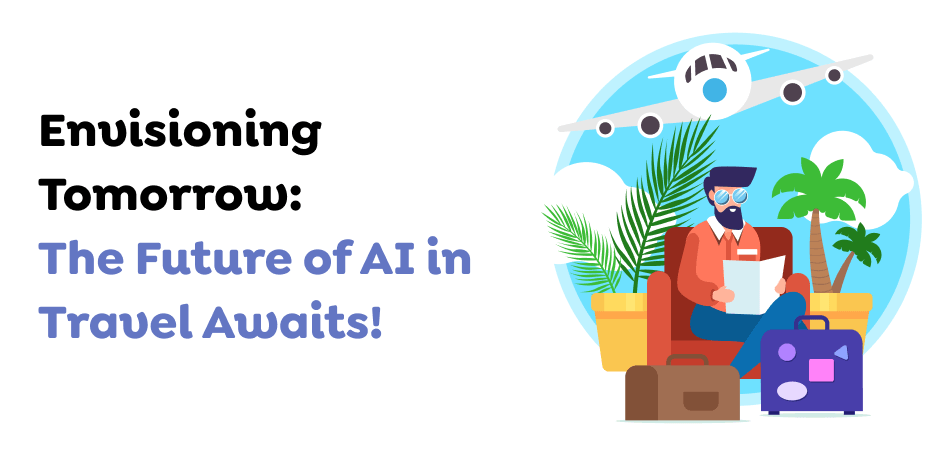
AI is expected to significantly increase and influence the professionalism and standardization the tourism industry enjoys over the next decade. According to a study of the world marketplace for travel technologies, which covers Artificial Intelligence, it is expected to increase by over 9 percent between 2020 and 2025.
Forbes published a report regarding the increasing use of Artificial Intelligence in the tourism and travel industry. The report anticipates that around 58 million job opportunities will arise by 2025.
AI can transform the traditional seller market into a buyer’s marketplace app, which is good news for tourists. AI-powered virtual tour guides will be patient, kind, and knowledgeable about travelers.
Virtual guides can help travelers make accurate, educated decisions that will positively alter their mindsets. According to a study, 11% of millennials prefer Artificial Intelligence, compared to 4% of the population over 35.
Also, even though human-based customer service is the preferred option, artificial intelligence has been identified as a critical component of the travel industry.
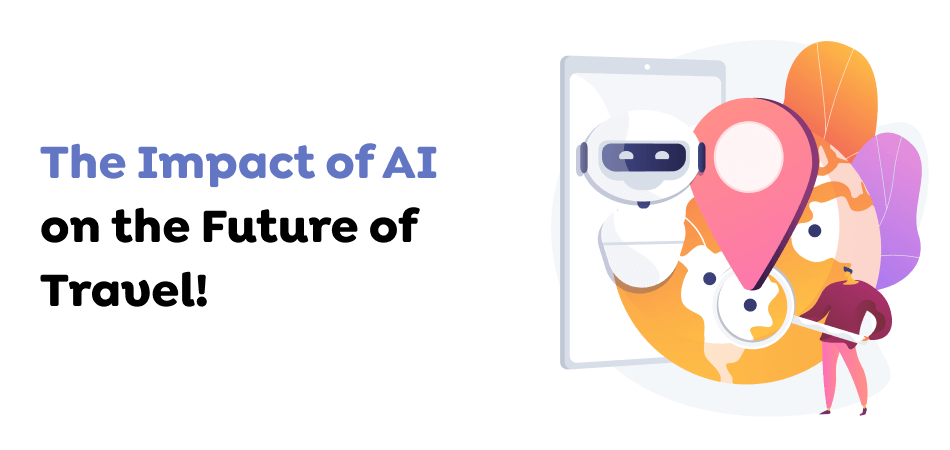
Artificial Intelligence (AI) in travel is an unimaginable change. Leveraging AI & ML development service in this industry, passengers can enjoy more customized and efficient travel experiences, with smoother experiences at each step. From enhancing booking processes to personalized suggestions and enriching each stage by enhancing connectivity to destinations, be it creating new ones, improving routes, or improving customer service, AI continues to have a profoundly transformative impact in this business sector.
Want to transform your travel solutions with cutting-edge AI? Start by hiring a leading travel app development company to build your futuristic travel app. Get in touch with Techugo today to discuss your vision and how our app development can bring it to life!
Write Us
sales@techugo.comOr fill this form